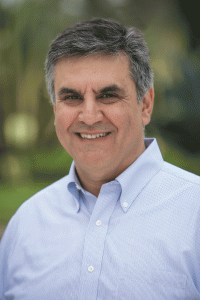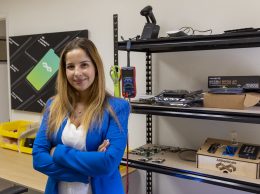Panesis: Startup community should Give First

Mike Panesis
By Mike Panesis
I’ll let you in on a secret. The most critical ingredient in a vibrant, resilient startup community can be summarized in two words: Give First.
The premise of Give First is simple. Community members who Give First contribute their time and talent to those who need it, without expectation of compensation.
You can Give First by mentoring, attending events, volunteering, giving advice and making connections to potential customers and investors.
Eventually, the community will return the favor, but when, how and from where cannot be predicted.
It’s easy to identify those who want to Give First. They show up at your doorstep wanting to know how they can help. No qualifications. No boundaries. No expectations. Put me to work doing good.
Give First is not the same as giving back. We hear that a lot at Hub101, Cal Lutheran University’s startup community hub. Those who have met with some measure of success in their lives want to share their knowledge and lessons learned with entrepreneurs and students. We value and celebrate those who give back, but there’s no need to wait until you are successful to Give First. Anyone who wants to contribute to the community should be given the opportunity. I would bet that everyone who gives back was inspired by someone who Gave First.
Give First is not paying it forward. That’s another way of giving back. If the universe does something good for you, it’s your obligation to do the same for someone else. Give First is a constant state of mind and independent of obligation.
Communities that abide by the Give First principle must protect their members from those who would exploit it.
It’s not OK to take from a Give First community if you are not truly in need, nor should you take if you have no intention of ever giving back. Ideally, those who benefit from the community should do so only after contributing to it.
Specific offers to contribute can be a slippery slope. For example, if someone offers to speak on a topic in which he or she is an expert and makes a living, you have to ask why. It may be a generous offer, but it also implies an expectation that the speaker is seeking customers from the audience. There’s nothing wrong with that, but it’s not conducive to community-building.
Those who take from a community unfairly are really asking, “What’s in it for me?” instead of “How can I help?”
How can Give First possibly be the first principle of a startup community? Aren’t startup communities supposed to spawn profit-seeking, voracious, competitive machines that put money before people and society?
There certainly are examples of that kind of behavior. But in the very early stages of a startup, everyone struggles, faces adversity and needs help. And we see in the generation exemplified by Cal Lutheran’s students a passion for doing good and doing well.
Give First is not a new concept. In a sense, it’s the lowest common denominator of human decency.
Christianity calls it the Golden Rule. Treat others as you want to be treated. It’s a principle that virtually every major religion recognizes.
So why can it be difficult to abide by? Acting in one’s self-interest is human nature. If you live a hectic life, as most of us do, it’s hard to prioritize helping others.
Living a Give First life takes practice. Here’s an exercise for you. The next time you’re at Starbucks, pay for the stranger behind you in line. Don’t think too much about it. Just do it. Perhaps you’ll just brighten someone’s day. Maybe you’ll inspire someone to do the same.
Then head over to Hub101 and ask, “How can I help?” We’ll have an answer for you.
• Mike Panesis is the executive director of California Lutheran University’s Center for Entrepreneurship.












